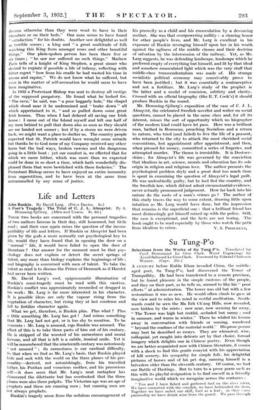Life and Letters John Ruskin. By David Larg. (Peter Davies.
5s:) THESE two books are concerned with the personal tragedies of two authors famous in their day, still honoured, but little
read ; and their case again raises the question of the incom-
patibility of life and letters. If Ruskin or Almqvist had been i;iven by the gods a more normally cut psychological key to life, would they have found that in opening the door on a
normal " life, it would have failed to open the door of literature ? Our answer for the moment must be that psy- chology does not explain or detect the secret springs of talent, any more than biology explains the beginnings of life ; and biography is concerned with men of talent. To take the talent as read is to discuss the Prince of Denmark as if Hamlet had never been written.
Mr. David Larg's cool, epigrammatic illumination of Ruskin's comi-tragedy must be read with this caution.
Ruskin's conflict was approximately reconciled or drugged in his work: Mr. Larg is far more interested in his character. It is possible ideas are only the vapour rising from the vegetation of character, but rising they at last condense and fall to fertilize character again.
What we get, therefore, is Ruskin plus. Plus what ? Plus a little something Mr. Larg has got ! And minus something that Mr. Larg had not got, or is too shy to mention. To be concrete : Mr. Larg is amused, ergo Ruskin was amused. The effect of this is to take three parts of him out of his century. lie is stripped of the worsted of his earnestness and moral fervour, and all that is left is a subtle, ironical smile. Yet it will be remembered that the nineteenth century was notoriously " not amused " ; its earnestness is our cardinal difficulty. So that when we find as Mr. Larg's basis, that Ruskin played hide and seek with the world on the three planes of his per-
sonality—derived, not astonishingly, from his travelled father, his Puritan and voracious mother, and his precocious self—it does seem that Mr. Larg's neat metaphor has discovered the dilettante but has overlooked that the three planes were also three pulpits. The Victorian age was an age of prophets and these are cunning men ; but cunning men are not always prophets.
Ruskin's tragedy arose from the sedulous encouragement of
his precocity as a child and his emasculation by a devouring mother. She was that overpowering nullity : a clearing house for other people's lives, and Mr. Larg is excellent in his exposure of Ruskin revenging himself upon her in his wrath against the ugliness of the middle classes and their. doctrine of salvation by the intercession of the railway. Yet, as Mr. Larg suggests, he was defending landscape, landscape which he preferred empty of everything but himself, and lit by that ideal and somehow emasculated light which was the very stuff that middle-class transcendentalism was made of. His strange socialistic political economy may conceivably prove to have been justified ; but it was essentially a contraceptive and not a fertilizer. Mr. Larg's study of the prophet is the latter and a model of concision, subtlety and clarity. Crossed with an official biography (like E. T. Cook's) it should produce Ruskin in the round.
Mr. Hemming-SjOberg's exposition of the case of C. J. L. Almqvist, the celebrated Swedish novelist and writer on social questions, cannot be placed in the same class and, for all its interest, misses the sort of opportunity which no biographer of the modern kind could have let pass. Here was a brilliant man, bathed in Rousseau, preaching Socialism and a return to nature, who tried (and failed) to live the life of a peasant; who returned to the city to attack the most cherished social conventions, lost appointment after appointment, and then, when pressed for money, committed a series of forgeries, and attempted murder. The theme is irresistible. It is Dostoev-
skian ; for Almqvist's life was governed by the conviction that idealism in art, science, morals and education has its sole origin in religion and religious love. The author presents the
psychological problem dryly and a great deal too much time is spent in examining the question of Almqvist's legal guilt.
He was undoubtedly guilty, but he had fled the country, and the Swedish law, which did not admit circumstantial evidence, never actually pronounced judgement. How far back into his nature do the roots of a man's crimes go ? The author of this study traces the way to some extent, drawing little upon intuition as Mr. Larg would have done, but the impression that remains is the superficial one : that a brilliant friend has most distressingly got himself mixed up with the police. Still, the case is exceptional, and the facts are not boring. The book ought to be read especially by those who watch the path






























 Previous page
Previous page